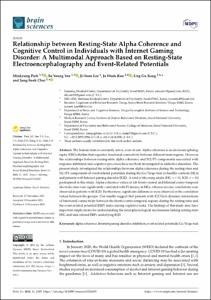Relationship between Resting-State Alpha Coherence and Cognitive Control in Individuals with Internet Gaming Disorder: A Multimodal Approach Based on Resting-State Electroencephalography and Event-Related Potentials
- Title
- Relationship between Resting-State Alpha Coherence and Cognitive Control in Individuals with Internet Gaming Disorder: A Multimodal Approach Based on Resting-State Electroencephalography and Event-Related Potentials
- Author(s)
- Park, Minkyung ; Yoo, So Young ; Lee, Ji-Yoon ; Koo, Ja Wook ; Kang, Ung Gu ; Choi, Jung-Seok
- DGIST Authors
- Park, Minkyung ; Yoo, So Young ; Lee, Ji-Yoon ; Koo, Ja Wook ; Kang, Ung Gu ; Choi, Jung-Seok
- Issued Date
- 2021-12
- Type
- Article
- Author Keywords
- alpha coherence ; Internet gaming disorder ; inhibition ; event-related potentials ; Go ; Nogo task
- Keywords
- DEFAULT MODE NETWORK ; FUNCTIONAL CONNECTIVITY ; EEG COHERENCE ; ALCOHOLISM ; SIGNATURES ; VOLUME ; P300 ; TASK
- ISSN
- 2076-3425
- Abstract
- The human brain is constantly active, even at rest. Alpha coherence is an electroencephalography (EEG) rhythm that regulates functional connectivity between different brain regions. However, the relationships between resting-state alpha coherence and N2/P3 components associated with response inhibition and cognitive processes have not been investigated in addictive disorders. The present study investigated the relationships between alpha coherence during the resting state and N2/P3 components of event-related potentials during the Go/Nogo task in healthy controls (HCs) and patients with Internet gaming disorder (IGD). A total of 64 young adults (HC: n = 31; IGD: n = 33) participated in this study. Alpha coherence values at left fronto-central and bilateral centro-temporal electrode sites were significantly correlated with P3 latency in HCs, whereas inverse correlations were observed in patients with IGD. Furthermore, significant differences were observed in the correlation values between the groups. Our results suggest that patients with IGD lack dynamic interactions of functional connectivity between the fronto-centro-temporal regions during the resting state and the event-related potential (ERP) index during cognitive tasks. The findings of this study may have important implications for understanding the neurophysiological mechanisms linking resting-state EEG and task-related ERPs underlying IGD.
- Publisher
- MDPI AG
- Files in This Item:
-
 기타 데이터 / 946.47 kB / Adobe PDF
download
기타 데이터 / 946.47 kB / Adobe PDF
download
- Appears in Collections:
- Department of Brain Sciences ETC 1. Journal Articles



